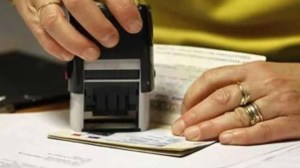As states debate ban on non-iodised salt, Kerala keeps mum
NEW DELHI, SEPT 1: The State Health Ministers' conference yesterday saw the emergence of diverse views on the iodised salt controversy, wi...

NEW DELHI, SEPT 1: The State Health Ministers’ conference yesterday saw the emergence of diverse views on the iodised salt controversy, with some states asking for a study into the necessity of iodine in various places and some taking the stand that the state should not think twice before banning non-iodised salt.
Amidst all this, Kerala stood alone, perched in the privileged position of being non-committal as it is the only state in the country where the Central notification for banning non-iodised salt was never issued or implemented.
Kerala Health Minister V.C.Kabir even chose to leave the venue without reading out his statement and told The Indian Express that he did not want to be part of the controversy. His statement, read by the state Health Secretary, said that the state had always implemented its programmes with the consent of the people and the iodine drive was no different. It said that if reservations have been expressed about the benefit of everyone using iodised salt, then the state has put those aspects also before the public to make up their minds about the issue.
Later, bureaucrats commented that Kerala had managed to be neither here nor there even as Delhi Health Minister A.K. Walia underlined the dilemma of most states which had already issued the ban notification.
Walia said that the states which had banned uniodised salt could not afford to withdraw it as it would send a wrong signal to the public. They would think that the earlier ban was a mistake and was now being rectified, Walia explained. He also said that the fears of intake of excess iodine were misplaced as the World Health Organisation has said that one can safely consume upto 1,000 micrograms per day though the body’s requirement was only upto 150 micrograms per day.
Gujarat offered to sell salt for the whole nation for Rs one per kilo if the Central Government would provide it with iodine. But the state Minister said that Gujarat was not sure if the state should force something — even though it was good — on its people through a law. It can be taken to people through better awareness, by letting states have their own programmes in regional languages, he said.
The Himachal Health Minister advocated a ban and giving a colourful simile, said that just as there was no way to go up a mountain other than climbing it, so also there was no way to avoid iodine deficiency other than by preventing the use of non-iodised salt. Minister J.P. Nadda recalled that his state being hilly, had a high incidence rate of goitre in the 60s but with a systematic programme, there is hardly any iodine deficiency disease in the state, he said.
Punjab minister Baldev Raj Chawla however said that he would not go for a total ban on non-iodised salt. He said that in his state, three out of 70 districts had reported incidence of iodine deficiency. Chawla said that a panel of agriculture and soil experts and other scientists should be set up to find out the actual iodine content in soil in different parts of the country. And then, the ban notification can be either withdrawn, modified or implemented.
Photos





- 01
- 02
- 03
- 04
- 05


























